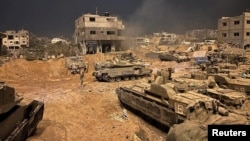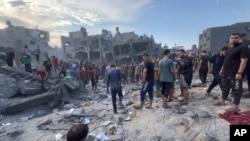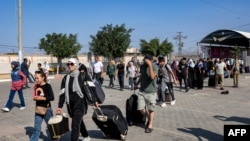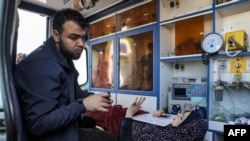Latest developments:
- Internet and phone networks are down across the Gaza Strip on Wednesday, the Palestinian telecommunications agency said.
- U.N. Humanitarian Affairs Office said 216 Palestinians were killed in Gaza in the past 24 hours.
- U.N. Secretary-General António Guterres said “level of humanitarian assistance that has been allowed into Gaza up to this point is completely inadequate.”
- News outlets say foreign nationals and dual citizens trapped in Gaza since war began Oct. 7 entered Egypt Wednesday through Rafah border crossing.
- First group of injured Palestinians will be taken into Egypt for medical treatment.
- U.S. Secretary of State Antony Blinken to return to region Friday.
Gaza is once again experiencing a total communications blackout.
The enclave’s telecommunications service provider Paltel (Palestine Telecommunication Company) issued a statement late Tuesday on X, the social media website formerly known as Twitter, informing residents of a complete outage of all telephone and Internet services. The company said the outage was “due to international routes that were previously reconnected being cut off again.”
Gaza suffered a complete communications blackout for two days beginning last Friday, leaving the besieged territory’s 2.3 million people cut off from the world and stalling delivery of critical international relief supplies.
The latest disruption of phone and Internet service occurred hours after an Israeli airstrike on a Palestinian refugee camp in the northern Gaza city of Jabaliya that left at least 50 people dead and 150 others wounded, according to Palestinian health authorities.
An Israeli army spokesman confirmed the airstrike to CNN, saying “a very senior Hamas commander” was in the area. A statement by the Israel Defense Forces later identified the man as Ibrahim Biari and said he was a ringleader of the "murderous terror attack" on Oct. 7 by Hamas militants in southern Israel.
Jabaliya was home to the families of refugees from wars dating back to 1948, according to Reuters. A statement from Hamas said that no commanders were at the camp and put the casualties at 400 dead or wounded. The figures could not be independently verified, Reuters said.
Israel accuses Hamas, designated a terrorist group by the U.S. and others, of using civilians as shields and having a sprawling network of tunnels underneath Gaza where it is believed to be stockpiling weapons, food and other supplies.
The airstrike on the Jabaliya refugee camp angered several of Israel’s Arab neighbors. The United Arab Emirates’s foreign ministry issued a statement saying the attack will lead to “irreparable ramifications in the region.” The kingdom once again called for “an immediate ceasefire to prevent further loss of life.”
Saudi Arabia condemned the attack as “inhumane targeting by the Israeli occupation forces,” while a spokesman for Iran’s foreign ministry said the attack was yet another war crime committed by Israel in a post on the messaging site Telegram.
Tuesday’s attack on Jabaliya was the latest in a series of ground and air strikes by Israel’s military aimed at Hamas and its extensive tunnel network in Gaza. The IDF earlier Tuesday said an airstrike killed another Hamas commander who orchestrated the Oct. 7 terror attack that left 1,400 people dead.
The IDF and Shin Bet, Israel's domestic security service, said Nasim Abu Ajina was the commander of the Beit Lahia Battalion of Hamas' Northern Brigade and took part in the development of the unmanned aerial vehicles and paragliders involved in the brazen invasion.
The IDF said Wednesday it has “struck over 11,000 targets belonging to terrorist organizations in the Gaza Strip” since the start of the war – an average of more than 440 strikes per day.
No End in Sight for Humanitarian Crisis
Israeli airstrikes have led to a humanitarian crisis in the crowded Palestinian enclave.
The United Nations humanitarian agency (OCHA) says 216 Palestinians were killed in Gaza between Monday and Tuesday, citing figures by the Hamas-run Palestinian Health Ministry. The total number of fatalities has risen to more than 8,500, 67% of them women and children.
The agency said another 59 trucks carrying supplies of food, water and medicines entered Gaza Tuesday through the Rafah crossing with Egypt, the largest such convoy of humanitarian aid since Oct. 21, bringing the total number of trucks to 217. But it says critically needed fuel supplies to operate life-saving equipment remain banned.
"The level of humanitarian assistance that has been allowed into Gaza up to this point is completely inadequate and not commensurate with the needs of people in Gaza, compounding the humanitarian tragedy," U.N. Secretary-General Antonio Guterres said on Tuesday, reiterating his call for a humanitarian truce.
OCHA says more than 1.4 million people in Gaza have been internally displaced as of Tuesday, with over 689,000 sheltering in facilities run by the U.N.’s Palestinian refugee agency.
CNN reported Wednesday that some 80 ambulances arrived at the Rafah border crossing to receive injured Palestinian patients, quoting an Egyptian border official.
The patients will be the first known Palestinians allowed out of Gaza since the start of the three-week-old war.
An Egyptian border official told the U.S.-based news network the crossing was prepared to allow 81 wounded Palestinians from Gaza to receive treatment in Egyptian hospitals.
Meanwhile, news outlets say foreign nationals and dual citizens who have been trapped in Gaza began entering Egypt through the Rafah border crossing Wednesday.
Blinken to Return to Region Friday
U.S. Secretary of State Antony Blinken will travel to Israel Friday for meetings with members of the Israel government, with plans to “make other stops in the region,” according to a brief statement by spokesman Matthew Miller.
Miller said Blinken spoke by phone Tuesday with Israeli President Isaac Herzog. He said Blinken reaffirmed U.S. support for Israel’s right to defend itself against terrorism “consistent with international humanitarian law and emphasized the need to take feasible precautions to minimize harm to civilians.”
Blinken and Herzog also pledged to work tirelessly to free the 240 hostages being held by Hamas, increase the “pace and volume of humanitarian assistance” for Palestinian civilians in Gaza, and prevent the conflict from spreading.
Some information for this report came from The Associated Press, Reuters, and Agence France Presse.




